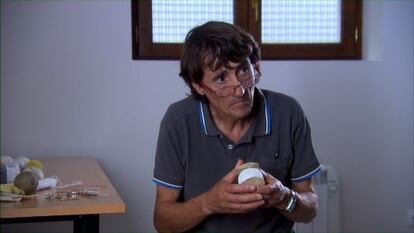Terrorists and victims question a painful history
Observers encourage dialogue initiative by ETA prisoners


"I talked with them about my story, about my family's exile during the Franco years, about the pain of those years, about ETA before Franco, and ETA after Franco, about my beginnings in journalism, in 1977, when my job was basically about covering attacks and funerals, one after another, about my own status as a victim of ETA after surviving the parcel bomb in 2001... I saw in them a desire to explain, to recognize the pain that they had caused, to question what they had done and to transmit what they were going through to the outside world. Above all they wanted to talk. We talked for more than two hours."
Journalist Gorka Landaburu visited Nanclares de Oca prison in the Basque province of Álava on November 29, 2011. He spoke with a group of former ETA activists that have broken with the rest of the terror group's prisoners and have asked for workshops to be set up for them to discuss their role in the violence of the last 40 years in pursuit of Basque independence.
"I told them: 'You have taken an important step, and one that required courage, because you are just 20 or 30 out of 500 and in all likelihood you will be ostracized for doing this by the rest of the prisoners, who do not want to make any move, hoping that the issue of their relocation or early release will be settled in talks'," says Landaburu. "Urrusolo said that he believed that in the long run, all prisoners would have to do as they had, but he was worried about just how such a process could be initiated. We talked about how they would have to make themselves heard outside the jail, that they would have to tell the world their stories, to explain how they had reached this point, that they now no longer believed that violence was the way to achieve their aims, and that they had changed their views... They still have a long road to travel, but I believe that theirs is the only approach. They have been brave, and we should recognize that. If only more prisoners would follow their lead."
When the workshop ended, two prisoners approached Landaburu: "We were part of the Buruntza cell, the ones who sent you that parcel bomb in 2001. We didn't take part in it directly, but we want to ask you to forgive us," they said. "I was grateful to them for that," says Landaburu. "Some people say that I suffer from Stockholm Syndrome, but it isn't true. I am lucky to have survived an attempt on my life. On that basis I want peace for my children and their children. I have lived through two dictatorships: Franco's and ETA's. I want peace. But not at any price: there has to be justice, remembrance, and reparation for the victims. That is fundamental."
A month earlier, on October 18, Jaime Arrese and Iñaki García Arrizabalaga had attended a workshop in the prison. Their fathers had been killed in 1980 by ETA.
"We each spoke about our own experiences," says Arrese. "I told them about the mood in those days, which was very different to that of today, and that people blamed the victims, and justified the attacks. At the same time as trying to get over the death of your father, you had to overcome the environment around you. They were very struck by that reality. They also had a lot of questions about the different associations representing ETA victims and their families, about how they were organized, and about the law. There were nine of them there that day, and they all took part in the discussion. But two or three were particularly active."
You have taken an important step, and one that required courage, because you are just 20 or 30 out of 500 prisoners"
Arrese says that the prisoners were very critical of ETA. "I know that they are only 20 or 30 out of 500, but I think that this is the only way toward dealing with the moral and ethical issues involved, and we must also remember that they have very little to gain from this. They have talked about this for a long time, and they are perfectly clear about what they are doing. They also know what ETA has done, and they want to dissect the whole process. I think that they are earning the right to a second chance in life. They are looking at things in a way that can lay the foundations of peace. They recognize the damage and harm they have caused, and they want to make amends. They accept responsibility for the decisions they took. They are taking a moral and ethical stance."
The workshops took place once a week between between October 27 and November 30, 2011. Around 10 prisoners took part in the sessions, with some 10 outsiders coming in, among them writer Manuel Reyes Mate; the former rector of the University of the Basque Country, Pello Salaburu; Paul Ríos, the head of pro-peace civic group Lokarri; Jonan Fernández, the head of peace studies center Baketik; writer Carlos Martín Beristain; mediator Alberto Olalde, and Joseba Arregi, a former head of the Basque regional government's arts council.
"I spoke to them about the victims and about those responsible for creating victims," says Reyes Mate. "In the case of those responsible for the violence, it is a complicated process that must start with recognizing what he or she has done, and that what they have done is to cause tremendous damage and suffering, rather than an act of heroism. The final stage in the process, which may or may not happen, must be to ask for forgiveness. There was a very lively discussion in which they said that while it was essential to talk about ETA's victims, it was also important to remember those who had been affected by the state's violence: it was necessary for all sides of the story to be told. They aren't expecting to just be able to move on without addressing these issues: they know what they have to do. They are trying to explain the context within which they committed acts of terrorism, but they are not trying to justify what they did. They were all clearly at different stages in coming to terms with what they have done. Some talked in terms of what they had done to a particular person. Others went further and recognized the harm they had done to society as a whole. They were all very sure about being ready to talk to the victims of their actions. They also want the rest of society to recognize the cost to them and their families of what they are doing."
"I was very impressed with what I heard and saw," Reyes Mate continues. "This was a very intense discussion, like nothing I have ever experienced. You are talking to people who have committed serious crimes, but who now recognize how pointless what they did was. One of them sat there throughout and said nothing, but at the end got up and gave me a big hug and said thank you. Pikabea was very articulate. Urrusolo was more combative, more dialectical. He asked what they could do. I told them that they had to create a critical space within Basque society in which to look at violence and to find a way to reach out to the victims and to heal the wounds of the past. The people who committed the crimes have a role to play, a very important role to play, in the healing process."
"I found it very emotional," says Salaburu. "They wanted to know what was going on in the outside world. They are not allowed access to much information. They are very isolated. They had read my articles about the importance of the peace process not leading to a dead end, and they had talked long and hard about this. Many of them were very critical of the way the Basque radical left was dealing with the issue of the victims of violence."
For the moment no further workshops are planned, although the Interior Ministry is considering starting them up again. But for the moment, the issue of ETA prisoners remains stalled, with neither the government nor the Basque nationalist community prepared to make the first move.
Tu suscripción se está usando en otro dispositivo
¿Quieres añadir otro usuario a tu suscripción?
Si continúas leyendo en este dispositivo, no se podrá leer en el otro.
FlechaTu suscripción se está usando en otro dispositivo y solo puedes acceder a EL PAÍS desde un dispositivo a la vez.
Si quieres compartir tu cuenta, cambia tu suscripción a la modalidad Premium, así podrás añadir otro usuario. Cada uno accederá con su propia cuenta de email, lo que os permitirá personalizar vuestra experiencia en EL PAÍS.
¿Tienes una suscripción de empresa? Accede aquí para contratar más cuentas.
En el caso de no saber quién está usando tu cuenta, te recomendamos cambiar tu contraseña aquí.
Si decides continuar compartiendo tu cuenta, este mensaje se mostrará en tu dispositivo y en el de la otra persona que está usando tu cuenta de forma indefinida, afectando a tu experiencia de lectura. Puedes consultar aquí los términos y condiciones de la suscripción digital.








































